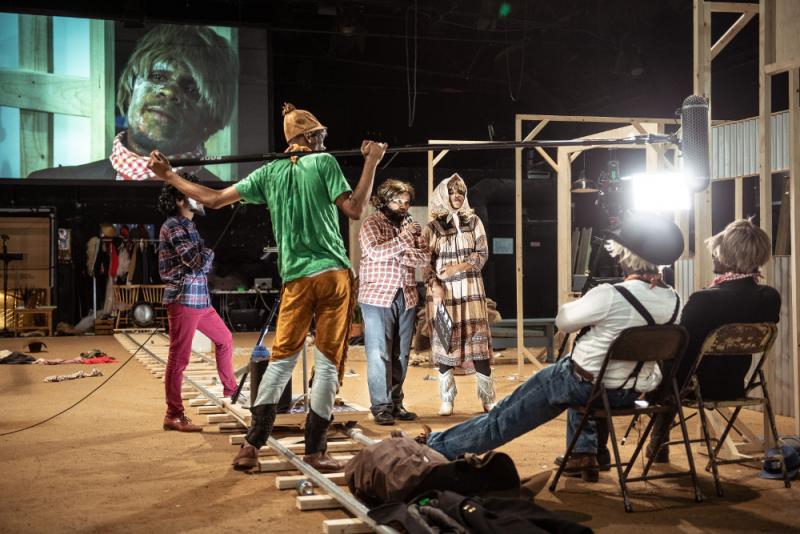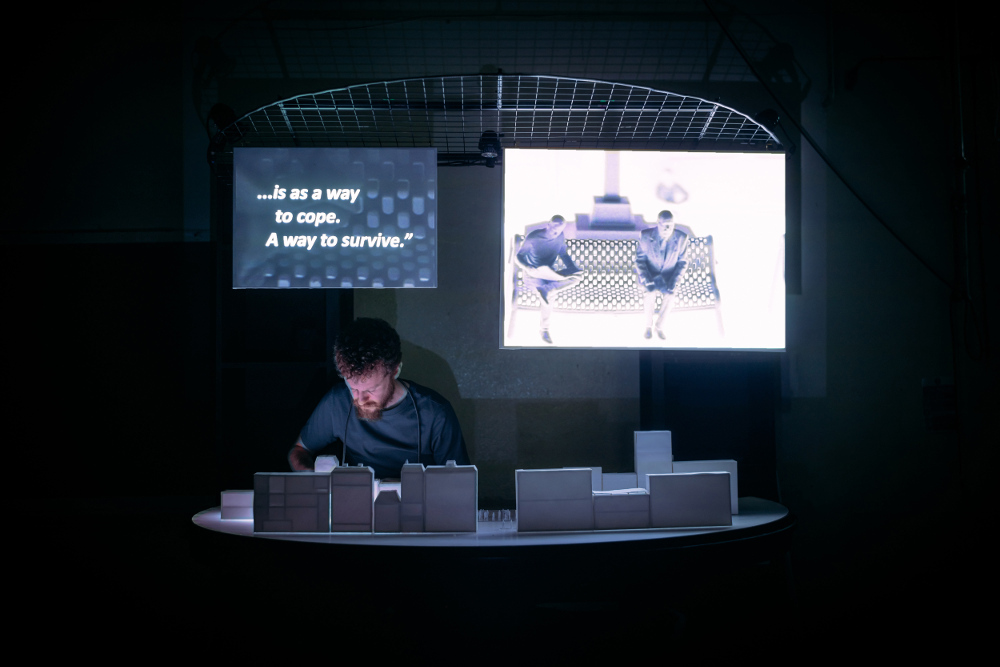Edinburgh Fringe 2023 reviews: Dark Noon / Concerned Others | reviews, news & interviews
Edinburgh Fringe 2023 reviews: Dark Noon / Concerned Others
Edinburgh Fringe 2023 reviews: Dark Noon / Concerned Others
A brutal history of America and an intimate examination of Scottish drug-related deaths in two powerful shows

Dark Noon, Pleasance at EICC ★★★★★
If there’s a more ambitious theatre production than Dark Noon at the Fringe this year, I’ve yet to see it. That’s ambitious in terms of its staging: during the course of the show’s 100 minutes (yes, it’s a proper, full-length production), virtually an entire town is constructed on a bare red-earth stage right before our eyes. But it’s also ambitious in terms of its themes and subject matter. This is the history of the Wild West, the great American push to the Pacific, frontier pioneers, gold rushes and the law of the gun. It’s a world of corruption and exploitation, of racism, abuse, violence and pain, interrogated up close by roving cameras and projected live onto a giant screen at the back of the set. And it’s told by an apparently tireless, fiercely committed company of seven South African actors (six black, one white).
Yes, race is the huge issue sitting squarely on top of Dark Noon. And it’s thrown in our faces – or rather the actors’ faces – right from the show’s very opening moments. We might rightly condemn white actors blacking up to play non-white characters, on many levels. How do we feel about black actors daubing their faces with white greasepaint to portray the early white settlers, missionaries, prostitutes and sherrifs who colonised a continent?
But before you’ve even had a chance to weigh up the implications of that, Dark Noon has dashed on to equally provocative portrayals, recounting with unflinching honesty the brutality and raw greed on which modern America is built, conveying its sometimes shocking setpieces with an apparently casual, throwaway disregard that conceals a steely sense of fury.
It’s jaw-droppingly audacious, and breathtakingly fearless, daring you to either look away or challenge what you’re seeing. It’s as if the oppressed or the vanquished have been asked for their views on how things have been for them, only to respond with harrowing honesty – and a lot of pitch-black humour too. And, it has to be said, increasingly deep involvement from the audience as the show progresses, making us not just complicit but a key part of the action.
Danish and South African co-directors Tue Biering and Nhlanhla Mahlangu have constructed a seemingly sprawling, chaotic work – with maybe just the kind of raw authenticity middle-class Western watchers might expect to experience from black township actors – that’s actually highly sophisticated, tightly controlled and bristling with righteous, finger-pointing fury. It’s in a big venue (and a comfortable one, too), with tickets available until the end of the festival. If you’re in Edinburgh, I urge you to experience it.
 Concerned Others, Summerhall ★★★★
Concerned Others, Summerhall ★★★★
From one of the Fringe’s biggest, most lavish productions to what must be one of the festival’s smallest, most focused, most intimate shows. Though Concerned Others from Edinburgh-based visual theatre company Tortoise in a Nutshell still grapples with a weighty theme: Scotland’s shamefully high rate of drug-related deaths, the highest in Europe, one of the highest in the world.
But don’t go looking for simple answers, much less finger-pointing condemnation in this deceptively slight solo tabletop show. Through live animation, video, intricate miniature models and even some live-action physical performance, deviser/performer Alex Bird (also one of the company’s co-founders) stares unflinchingly at the fallout of drug- and alcohol-related deaths, how those substances are embedded within Scottish society, and the lasting impacts on those left behind.
Most impressive, though, is Concerned Others’ elegant staging, involving a moveable, tippable table of lights, and multiple boards serving as miniature screens for Lewis Den Hertog’s eloquent video projections – sometimes little more than subtitles for the spoken text we’re hearing from survivors and health professionals, or endless alcohol adverts, but powerfully done. A running man serves as the image that both separates and unites Bird’s developing sections, first as animated stick figure, then as primitive zoetrope before becoming embodied in Bird’s own body. Tiny sets of rooms and buildings, explored through Bird’s roving camera, provides a context for the tales of neglect, poverty and abuse we’re told lie behind these issues.
At just 45 minutes, and with its content and messages seemingly boiled down to such concentration that not a single gesture or word feels superfluous, there’s a danger that Concerned Others might feel like little more than a theatrical lecture. But it’s Bird’s fluent presentation, and his assured movement from idea to idea, that both display the show’s impressive craft and make it so deeply moving.
Share this article
The future of Arts Journalism
You can stop theartsdesk.com closing!
We urgently need financing to survive. Our fundraising drive has thus far raised £49,000 but we need to reach £100,000 or we will be forced to close. Please contribute here: https://gofund.me/c3f6033d
And if you can forward this information to anyone who might assist, we’d be grateful.

Subscribe to theartsdesk.com
Thank you for continuing to read our work on theartsdesk.com. For unlimited access to every article in its entirety, including our archive of more than 15,000 pieces, we're asking for £5 per month or £40 per year. We feel it's a very good deal, and hope you do too.
To take a subscription now simply click here.
And if you're looking for that extra gift for a friend or family member, why not treat them to a theartsdesk.com gift subscription?
more Theatre
 Edinburgh Fringe 2025 reviews: Ordinary Decent Criminal / Insiders
Two dramas on prison life offer contrasting perspectives but a similar sense of compassion
Edinburgh Fringe 2025 reviews: Ordinary Decent Criminal / Insiders
Two dramas on prison life offer contrasting perspectives but a similar sense of compassion
 Edinburgh Fringe 2025 reviews: Kinder / Shunga Alert / Clean Your Plate!
From drag to Japanese erotica via a French cookery show, three of the Fringe's more unusual offerings
Edinburgh Fringe 2025 reviews: Kinder / Shunga Alert / Clean Your Plate!
From drag to Japanese erotica via a French cookery show, three of the Fringe's more unusual offerings
 The Two Gentlemen of Verona, RSC, Stratford review - not quite the intended gateway drug to Shakespeare
Shakespeare trying out lots of ideas that were to bear fruit in the future
The Two Gentlemen of Verona, RSC, Stratford review - not quite the intended gateway drug to Shakespeare
Shakespeare trying out lots of ideas that were to bear fruit in the future
 Edinburgh Fringe 2025 reviews: The Horse of Jenin / Nowhere
Two powerful shows consider the Israeli-Palestinian conflict, with mixed results
Edinburgh Fringe 2025 reviews: The Horse of Jenin / Nowhere
Two powerful shows consider the Israeli-Palestinian conflict, with mixed results
 Edinburgh Fringe 2025 reviews: The Fit Prince / Undersigned
A joyful gay romance and an intimate one-to-one encounter in two strong Fringe shows
Edinburgh Fringe 2025 reviews: The Fit Prince / Undersigned
A joyful gay romance and an intimate one-to-one encounter in two strong Fringe shows
 Tom at the Farm, Edinburgh Fringe 2025 review - desire and disgust
A visually stunning stage re-adaptation of a recent gay classic plunges the audience into blood and earth
Tom at the Farm, Edinburgh Fringe 2025 review - desire and disgust
A visually stunning stage re-adaptation of a recent gay classic plunges the audience into blood and earth
 Works and Days, Edinburgh International Festival 2025 review - jaw-dropping theatrical ambition
Nothing less than the history of human civilisation is the theme of FC Bergman's visually stunning show
Works and Days, Edinburgh International Festival 2025 review - jaw-dropping theatrical ambition
Nothing less than the history of human civilisation is the theme of FC Bergman's visually stunning show
 Every Brilliant Thing, @sohoplace review - return of the comedy about suicide that lifts the spirits
Lenny Henry is the ideal ringmaster for this exercise in audience participation
Every Brilliant Thing, @sohoplace review - return of the comedy about suicide that lifts the spirits
Lenny Henry is the ideal ringmaster for this exercise in audience participation
 Edinburgh Fringe 2025 reviews: The Beautiful Future is Coming / She's Behind You
A deft, epoch-straddling climate six-hander and a celebration (and take-down) of the pantomime dame at the Traverse Theatre
Edinburgh Fringe 2025 reviews: The Beautiful Future is Coming / She's Behind You
A deft, epoch-straddling climate six-hander and a celebration (and take-down) of the pantomime dame at the Traverse Theatre
 Good Night, Oscar, Barbican review - sad story of a Hollywood great's meltdown, with a dazzling turn by Sean Hayes
Oscar Levant is an ideal subject to refresh the debate about media freedom
Good Night, Oscar, Barbican review - sad story of a Hollywood great's meltdown, with a dazzling turn by Sean Hayes
Oscar Levant is an ideal subject to refresh the debate about media freedom
 Edinburgh Fringe 2025 reviews - Monstering the Rocketman by Henry Naylor / Alex Berr
Tabloid excess in the 1980s; gallows humour in reflections on life and death
Edinburgh Fringe 2025 reviews - Monstering the Rocketman by Henry Naylor / Alex Berr
Tabloid excess in the 1980s; gallows humour in reflections on life and death
 Edinburgh Fringe 2025 reviews: Lost Lear / Consumed
Twists in the tail bring revelations in two fine shows at the Traverse Theatre
Edinburgh Fringe 2025 reviews: Lost Lear / Consumed
Twists in the tail bring revelations in two fine shows at the Traverse Theatre

Add comment